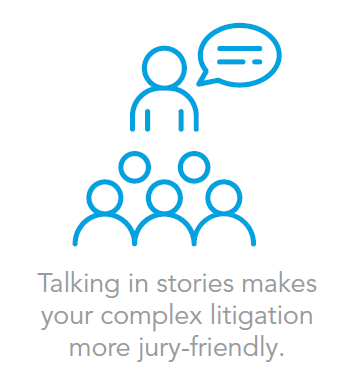We hear this quite a bit from our clients. An attorney, when introducing us to his pending complex litigation matter, tells us up front, “This is a complicated case.” It’s code for, “I don’t think jurors will understand this case.”
We hear it again in opening statements: “This is a complicated case.” So now, the attorney knows it’s a complicated case; the consultants know it’s a complicated case; the jurors know it’s a complicated case. Great. What now?
Here are a few ideas to help you connect your complex litigation to the jurors and make them more comfortable hearing it.
Change the Question
Instead of asking, “How can I make jurors understand my complex case?”, how about asking, “How can I simplify my case for the jurors (and the judge and the witnesses)?” This basic reframing can change your focus—instead of concentrating on the complexity, you and your team begin to think about simplification. There’s a big difference.
Don’t Tell the Jury It’s a Complicated Case
When you tell a juror the case is complicated, they hear one of two things: “They think I’m too stupid to understand this” or “This is going to be way above my head.” The first can cause them to feel offended and the second tends to stop them from listening. Finding ways to explain the unfamiliar in familiar terms helps them understand the concepts underlying your case. Characterizing the case does no good for anyone.
Tell the Jury a Story

Try thinking about your case as a story: What tale do you want to tell? Or think of it this way: If someone at a dinner party asked about your case, what would your side of the story sound like?
We all think in stories, especially from the jury box. Jurors want to know what happened between these opposing parties that landed them in court, not a list of evidence and intricate facts. Instead, tell a story that answers jurors’ questions about motives for the lawsuit and the significance of your case, which should (again) simplify the details. Talking in stories makes your complex litigation more jury-friendly.
There’s a saying that goes, “What you focus on expands.” Ultimately, the key to helping jurors understand your complicated case lies in focusing not on its complexity, but on its simplicity.




 />i
/>i


